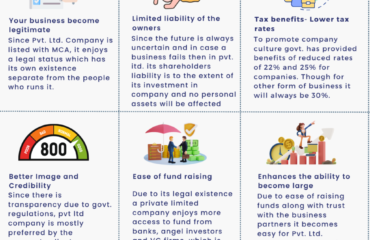What is a Software Company?
A software company is a firm that focuses on designing, selling, and maintaining software products and services. These organizations develop software solutions for a range of purposes, encompassing business applications, mobile apps, web development, and beyond. Within the technology industry, software companies are pivotal, leading the way in innovation and offering solutions to address a wide array of user requirements.

Different categories to register a Software Company in India
When establishing a software company in India, you have the option to select from various legal structures, including:
- Private Limited Company
- Limited Liability Partnership (LLP)
- Sole Proprietorship
- Partnership Firm
- One Person Company (OPC)
The choice of structure depends on factors like ownership, liability, and regulatory compliance.
Types Of Software Companies In India
Software companies in India can be categorized in different ways depending on their focus and specialization:
- Companies Specializing in Software Products: These entities engage in the development and marketing of software products tailored for specific industries or general use. Notable examples include Microsoft, Adobe, and Oracle.
- Companies Providing Software Services: Service-oriented software companies offer tailored services such as custom software development, IT consulting, and outsourcing, catering to the specific requirements of clients.
- Open Source Software Companies: These companies actively contribute to open-source software development while also offering support, customization, and consulting services for open-source software products.
- Web and Mobile App Development Companies: Specializing in the creation of web and mobile applications, including platforms for e-commerce, social media apps, and more.
- AI and Machine Learning Companies: These companies focus on solutions related to artificial intelligence (AI) and machine learning, encompassing areas such as natural language processing, computer vision, and data analytics.
Services provided by a Software Business in India
Software enterprises in India provide an extensive array of services, including:
- Software Development: Crafting personalized software solutions for both businesses and individuals.
- Mobile App Development: Designing and building mobile applications compatible with various platforms.
- Web Development: Constructing websites, web applications, and e-commerce platforms.
- Cloud Computing: Delivering solutions based on cloud services, encompassing storage, computing, and hosting.
- AI and Machine Learning: Developing applications powered by artificial intelligence, predictive analytics, and machine learning models.
- Software Testing and Quality Assurance: Verifying that software products adhere to predefined quality and performance standards.
- IT Consulting: Offering specialized knowledge in IT strategy, infrastructure, and technology adoption.
What are the Documents Required to Start a Software Company in India?
To start a software company in India, you typically need documents such as:
- Certificate of Incoporation
- Memorandum of Association (MOA) and Articles of Association (AOA)
- PAN Card
- TAN (Tax Deduction and Collection Account Number)
- Digital Signature Certificate (DSC)
- GST Registration Certificate
- Bank Account Documents
- Address Proof
- Board Resolution
- Shareholder and Director Details
- MSME
- IEC Code
- Trademark
What Is the Procedure to Start a Software Company?
The procedure to start a software company in India involves the following steps:
- Selecting a Business Structure: Opt for a legal structure (e.g., Private Limited Company, LLP) and complete the registration process for the business entity.
- Name Reservation: Secure a unique name for your company by going through the name reservation process.
- Obtain Digital Signatures: Directors and authorized signatories must acquire digital signature certificates (DSC).
- Apply for Director Identification Number (DIN): Directors are required to obtain DINs, which can be obtained through the Ministry of Corporate Affairs (MCA).
- Draft MOA and AOA: Develop the Memorandum of Association (MOA) and Articles of Association (AOA) for your company.
- File for Company Incorporation: Submit the requisite documents and forms to the Registrar of Companies (ROC) to initiate the company incorporation process.
- Get PAN and TAN: Apply for Permanent Account Number (PAN) and Tax Deduction and Collection Account Number (TAN) for tax-related purposes.
- GST Registration: Register for Goods and Services Tax (GST) if the annual turnover exceeds the prescribed threshold.
- Open Bank Account: Establish a business bank account to manage financial transactions.
- Compliance and Ongoing Filings: Adhere to annual filing and regulatory requirements in accordance with the chosen business structure
- IEC Code: Software companies exporting their products and services is required to obtain IEC code.
- Trademark: To maintain its uniqueness and creating brand identity it is important to obtain Trademark Registration of a Software Company.
How To Raise Funds For Software Company In India?
Approaches to secure funding for a software company in India encompass bootstrapping, angel investors, venture capital, bank loans, crowdfunding, and government schemes. The selection is contingent upon the business’s stage of development and its specific financial requirements.
How much does it cost to start a software company in India?
The startup expenses for a software company can exhibit significant variations, contingent on factors such as the type of software development, geographical location, operational scale, and chosen business model. Here are some typical costs to take into account:
- Office Space and Utilities: Necessary if opting for a physical office.
- Equipment and Technology: Involving computers, software licenses, servers, and development tools.
- Salaries and Wages: Allocated for developers, designers, testers, and additional staff.
- Marketing and Sales: Covering promotional efforts, website development, and advertising.
- Legal and Regulatory Costs: Encompassing business registration and compliance expenses.
- Intellectual Property Protection: Relevant for patent or copyright filings, if applicable.
- Operational Expenses: Including internet and phone bills, insurance, and licenses.
- Research and Development: Covering expenses linked to creating and enhancing your software product.
What is the Rule of 40 in Software Company?
The Rule of 40 in the context of software companies is a financial performance metric that aims to evaluate a company’s health and growth potential. It is calculated by adding a company’s growth rate to its profit margin. The formula is expressed as follows:
Rule of 40=Revenue Growth Rate+Profit MarginRule of 40=Revenue Growth Rate+Profit Margin
The Rule of 40 suggests that a healthy software company should have a combined value of revenue growth rate and profit margin that equals or exceeds 40%. In other words, if a company’s growth rate is 20%, its profit margin should be at least 20%, or if the growth rate is 30%, the profit margin should be at least 10%.
This metric provides a balance between high growth and profitability, indicating that a company is managing its growth efficiently without sacrificing profitability. It is commonly used in the software and technology industry to assess whether a company is in a sustainable and healthy growth state.
What is the maximum salary of a software engineer?
Factors such as location, experience, expertise, and the specific company or organization significantly impact the maximum salary of a software engineer. In high-demand tech hubs like Silicon Valley in the United States, senior software engineers at top tech companies can earn well into the six-figure range, sometimes exceeding $250,000 or more per year. It’s crucial to note that salary ranges can vary widely by region and market conditions. Additionally, compensation packages often include bonuses, stock options, and other benefits, which can significantly influence a software engineer’s total earnings.



